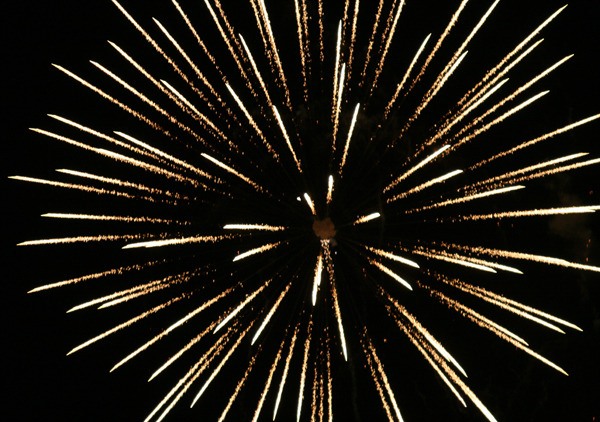“Safe and sane” fireworks have been extinguished.
San Juan County voters approved a ban on “safe and sane” fireworks Tuesday, 3,580 to 3,051. It was an affirmation of the public’s vote last year; the measure ended up back on the ballot after Superior Court Judge Don Eaton ruled that wording of a 2009 ballot measure challenging the county’s ban had been changed without the review of the measure’s sponsor, and ordered another vote.
On the eve of the election, fireworks advocate Don Burkhart was optimistic history would not repeat itself. A swing of 250 votes or so was all he felt he needed for the ban to be rejected.
Burkhart said the key to overturning the “safe and sane” ban was to ensure islanders realized how they were voting by marking “approve” or “reject” on the ballot. Of note, the wording on the ballot mentions only “fireworks” and does not distinguish between “safe and sane” and the type that already are outlawed.
Burkhart and others tried to keep their message simple for voters: “Reject the Ban.” But voters again upheld the ban.
Voters in 2009 upheld a ban by a 535-vote margin, making safe and sane fireworks as illegal to use as the more explosive kinds, and subject to a $250 fine for a first offense. Public safety officials endorsed the ban, citing the injury and fire risk from all fireworks. Law enforcement officials endorsed the ban, saying it would be easier to enforce a ban on all fireworks rather than trying to distinguish between legal and illegal fireworks.
Here’s a refresher to bring islanders back up to speed.
In June 2008, the County Council voted without dissent to ban the use of safe and sane fireworks at the behest of a countywide committee of public safety officials that includes the sheriff.
The law, which was to take effect by July 4, 2009, was put on hold after opponents, led by Blakely Island-based Fireworks Unrestricted, collected enough signatures to challenge it at the ballot box.
Voters approved the ban, but the ban was overturned by Eaton after the ballot measure describing the referendum prompted a legal challenge by Burkhart.
In his ruling, Eaton determined county officials failed to notify Burkhart of changes they made to the referendum’s ballot title as required by state law, and that it must go back before the voters.
Burkhart contended changes to the ballot title led to voter confusion. He believed eliminating that confusion is the key to quashing the ban.
Burkhart said the group simplified its message — “Reject the Ban” — and that he and supporters have been canvassing the community and had a booth at the San Juan County Fair to educate voters.
“We’ve been desperately trying to make it clear so people know which vote results in which outcome,” he said in an earlier interview.
Burkhart said dangerous fireworks — like firecrackers, which explode, and Roman candles, which fly into the air — are already prohibited countywide.
But Sheriff Bill Cumming said the ban on “safe and sane” fireworks is backed by the local chiefs association as a “step in the right direction” for public safety. Cumming said an all-out ban on fireworks is becoming more common among cities and counties.
“It seems to be the trend in public safety to recognize the overall problems associated with fireworks,” he said. “Problems like personal safety and fire and the threat to the environment. On the days leading up to the Fourth of July, on the 4th and on the days after, we do get a number of calls. We’re very busy. People call to complain about the noise, about livestock and about their animals’ reaction that accompany those fireworks.”
As it exists today, local law prohibits the use of fireworks which explode or fly into the air. The use of so-called “safe and sane” fireworks has been allowed, though only on the Fourth of July. The ban on safe and sane fireworks does not apply to professionally-licensed pyrotechnic displays, which require a permit.
Cumming said the ban on safe and sane fireworks will help to enforce the law already on the books. Officers can find it difficult to distinguish between various types of fireworks while at the scene of a potential violation.
Burkhart believed an all-out ban was too steep a price to pay for making enforcement easier.
“Are there some problems?” he said in an earlier interview. “Yes, there are, but almost exclusively with fireworks that are already illegal by state law. Acting on that by banning safe and sane fireworks is throwing the baby out with the bath water, and leaves us with the inherent contradiction of the need for a government-issued permit to celebrate our freedom.”



